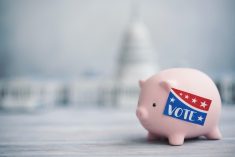Our city cousins almost unanimously believe a house is likely to be the biggest investment they will ever make. We have all heard this and many believe it to be true. Then, after purchasing a house, they often invest in renovations to increase its value, and, of course, they must invest in furniture to make the house livable. We all need a vehicle to drive around in, so we invest in a new vehicle and some aftermarket upgrades like a roof rack or hitch. Safety is critical, so we also invest in winter tires and for peace of mind we invest in an extended warranty.
Read Also

Cereal lodging isn’t just a nitrogen problem
Lack of copper in the soil can also lead wheat and other cereal crops to lodge during wet seasons on the Canadian Prairies.
Personal development is important, so we invest in ourselves by completing a university degree or an evening continuing education course. Along the lines of personal development, to prevent burnout, it’s important to take a break from our hectic schedules so we invest in a vacation, and when I was young, I invested a lot of time and money building friendships at pubs and parties … ya, right!
Problem is, none of these are true investments. They are either expenses or non-income-producing assets. The word “invest” is grossly overused in our consumption-oriented society. It is often used by salespeople to make us feel like we are making wise purchase decisions. Which statement is more likely to trigger a sale? 1) Isn’t that an investment you’ll really enjoy? Or 2) Isn’t that an expense you’ll really enjoy? The word “investment” evokes a positive feeling, while the word “expense” makes us cringe.
Three criteria
What makes me cringe, is the improper use of the word “investment.” To be a true investment, the purchase must meet three criteria:
- Interest paid to finance the purchase must be eligible for tax deductibility.
- The purchase has or has the potential to provide a steady stream of cash flow.
- The purchase has the potential to appreciate.
In no way am I suggesting that spending money as described are bad ways to spend money, I’m just trying to differentiate true investments from other types of spending. Education and self-development initiatives are important, rewarding expenses where using the word investment is forgivable.
These three criteria were developed around my investing philosophy, but can they apply to a business situation like a farm? Interest is tax deductible in a business setting whether the money goes to an expense or an investment, so that point doesn’t apply. However, point two and three could apply. Despite what a salesperson might say, buying a fungicide, fertilizer or seed isn’t an investment in the crop, they are expenses toward the crop. Necessary expenses perhaps, but still expenses.
What about a shiny new tractor? I would look at it like an automobile in a city setting. Perhaps necessary, perhaps not, but always a depreciating capital asset. Farmers can get into financial trouble through the purchase of too many such depreciating assets. Once again, be wary of salespeople positioning everything as an “investment.”
The award winner, however, in misappropriation of the word “investment” resides with governments. Listening to political leaders, it seems they never spend money. Everything is an “investment.” They invest in people through various programs including, most recently, CEBA.
What prompted this topic at this time was reading about significant new federal and Ontario provincial government “investments” in Zero Emissions Vehicles (ZEVs), aka electric cars. This is occurring after writing off significant “investments” in the auto industry made during the financial crisis. Once this money is spent, will it ever make it back to government coffers? The auto industry is looking like Bombardier, which has been the recipient of many “investments” from the government, while paying big executive bonuses and perpetually skating near bankruptcy.
We can’t do anything about how the government, nor salespeople use words, but we can control how we interpret those words. Critically evaluating whether a purchase is a true investment, an expense or a depreciating asset is likely to improve our decision-making process.
















